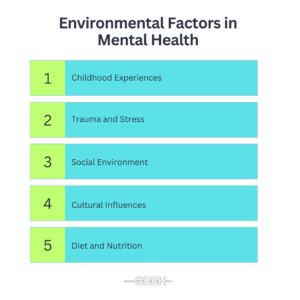Mental health disorders have long puzzled both researchers and individuals alike. While some people might experience severe mental health conditions, others may go through life without similar struggles, even in the same family. One major question that continues to arise is: Are mental health disorders inherited? In this blog post, we’ll explore the role genetics play in mental health conditions and discuss the types of mental health therapy programs that can help manage these conditions.
Understanding Mental Health Disorders and Genetics
Research indicates that genetics can play a significant role in the development of mental health disorders. Disorders such as depression, anxiety, bipolar disorder, and schizophrenia often run in families, suggesting a hereditary component. However, it’s crucial to recognize that genetics is just one piece of a much larger puzzle.
The Genetic Influence
- Heritability of Mental Health Disorders
- Studies suggest that certain mental health conditions can be inherited. For example, the heritability of schizophrenia is estimated to be around 80%, while depression has a heritability rate of about 37%.
- While having a family history of mental health disorders can increase the likelihood of developing these conditions, it does not guarantee that an individual will experience them.
- Gene-Environment Interaction
- The interplay between genetic predisposition and environmental factors is vital. Stressful life events, trauma, and lifestyle choices can trigger mental health issues in those who may have a genetic susceptibility.
- This means that even if a mental health disorder runs in your family, it can be influenced by external factors.
The Genetic Link to Mental Health
When we think about genetics, we often consider physical traits such as eye color, height, or even diseases like diabetes. But what about mental health? Research has shown that genetics do play a role in determining the likelihood of developing certain mental health disorders.
Studies have found that individuals with a family history of mental health disorders are more likely to develop similar conditions themselves. However, genetics isn’t the only factor. The environment, upbringing, and lifestyle choices also contribute significantly. So, while genetics might predispose someone to mental health challenges, it doesn’t necessarily mean they will develop a disorder.
Nature vs. Nurture
Nature refers to the genetic and hereditary factors, while nurture encompasses the environmental aspects, such as childhood experiences, social relationships, and lifestyle choices.
Genetic predisposition can increase the likelihood of developing mental health disorders, but nurture can act as a buffer or trigger. For example, someone with a genetic predisposition to depression may never develop it if they have a supportive environment and healthy coping mechanisms. On the other hand, those exposed to significant trauma or stress, even without a genetic predisposition, may still develop a mental health disorder.
Environmental Factors in Mental Health
While genetics plays a role, environmental influences are equally important in understanding mental health disorders. Factors such as upbringing, social relationships, and life experiences can significantly impact mental well-being.
1. Childhood Experiences
Childhood experiences lay the foundation for emotional health and can influence mental health throughout life. Adverse childhood experiences (ACEs) such as neglect, abuse, or parental substance use can increase the risk of developing mental health disorders. Conversely, supportive and nurturing environments can act as protective factors, promoting resilience and emotional stability.
- Nurturing Relationships: Positive relationships with caregivers and peers can foster a sense of safety and security, helping children develop healthy coping mechanisms.
- Educational Support: Access to quality education and supportive school environments can enhance self-esteem and emotional resilience.
2. Trauma and Stress
Traumatic events—whether in childhood or adulthood—can trigger or exacerbate mental health issues. Common sources of trauma include:
- Loss of a Loved One: Grieving can lead to profound emotional distress and, in some cases, develop into conditions like depression or PTSD.
- Major Life Changes: Events such as divorce, job loss, or moving to a new city can create significant stress, impacting mental health.
- Chronic Stress: Prolonged exposure to stress, whether from financial difficulties, work pressure, or personal relationships, can lead to anxiety and depression.
3. Social Environment
The social environment encompasses the relationships and social structures that influence an individual’s life. This includes:
- Family Dynamics: Healthy communication and support within a family can foster resilience, while conflict or dysfunction can contribute to mental health issues.
- Peer Relationships: Positive friendships can provide emotional support, whereas bullying or social isolation can significantly impact self-esteem and mental well-being.
4. Cultural Influences
Cultural background can shape perceptions of mental health and the stigma surrounding it. Different cultures may have varying beliefs about mental illness, which can affect an individual’s willingness to seek help.
- Cultural Norms: Societal expectations around expressing emotions or seeking help can either encourage or discourage individuals from addressing their mental health needs.
- Access to Resources: Cultural and socioeconomic factors can influence access to mental health resources, affecting the level of support individuals receive.
5. Lifestyle Factors
Certain lifestyle choices can also impact mental health, including:
- Diet and Nutrition: A balanced diet rich in essential nutrients can support overall mental health. Conversely, poor nutrition may contribute to mood disorders.
- Physical Activity: Regular exercise has been shown to reduce symptoms of anxiety and depression, enhancing overall well-being.
- Sleep Patterns: Quality sleep is essential for emotional regulation. Sleep disorders or insufficient rest can exacerbate mental health issues.
Types of Mental Health Programs
While genetics may play a role in mental health, effective treatments and programs can help manage symptoms and improve overall well-being. Here are some key mental health therapy programs that can provide relief and healing:
Cognitive-behavioral therapy (CBT)
One of the most widely used treatments in mental health programs, CBT focuses on identifying and challenging negative thought patterns and behaviors. Individuals learn to recognize harmful thinking and replace it with healthier, more constructive thoughts.
Dialectical behavior therapy (DBT)
A specialized form of CBT, dialectical behavior therapy focuses on emotional regulation, distress tolerance, and mindfulness. Originally developed to treat individuals with borderline personality disorder, DBT has since expanded to help those dealing with other mental health disorders, including trauma and self-harm tendencies. It’s commonly offered in a mental health treatment center in Massachusetts and across the U.S.
Acceptance and Commitment Therapy (ACT)
Acceptance and Commitment Therapy combines mindfulness with acceptance strategies, encouraging individuals to embrace their thoughts and feelings rather than fighting or avoiding them. This approach helps patients focus on meaningful actions in line with their values, even when they experience emotional distress.
Specialized Therapy Programs
Aside from individual therapies, there are also specific programs designed to cater to unique needs, such as trauma or group therapy settings.
Group Therapy Program
For many individuals, sharing experiences in a group setting can be incredibly therapeutic.. Whether it’s discussing coping strategies or gaining insights from others’ experiences, this program fosters community and shared healing. Group therapy can address a range of disorders, including addiction, depression, and social anxiety.
Trauma Therapy Program
Trauma is one of the major factors contributing to mental health disorders, especially in individuals with a genetic predisposition. Trauma therapy programs focus on addressing the emotional wounds caused by traumatic events, helping individuals process their experiences and move forward. Approaches like eye movement desensitization and reprocessing (EMDR) and somatic experiencing are often used in trauma-focused therapy. These programs are vital in helping those with post-traumatic stress disorder (PTSD) and other trauma-related conditions heal and reclaim their lives.
Mental Health Treatment Center in Massachusetts
If you’re located in Massachusetts, there are various mental health treatment centers that offer comprehensive care for a wide range of mental health conditions. These centers typically provide a combination of therapies tailored to the specific needs of each individual. Whether you are seeking support for anxiety, depression, trauma, or another mental health issue, a mental health treatment center can offer both outpatient and residential programs to provide the right level of care. These centers often integrate cutting-edge therapies such as CBT, DBT, and trauma-focused treatments.
Combining Genetics and Therapy
While you may not be able to control your genetic makeup, you can take steps to manage your mental health. Genetics may increase the risk of developing certain conditions, but proper care and therapy can make a significant difference. A combination of mental health therapy programs and a supportive environment can help individuals live healthier, more fulfilling lives, regardless of their genetic predispositions.
Conclusion
In summary, genetics does play a role in mental health disorders, but it’s only part of the picture. Environmental factors, personal experiences, and lifestyle choices also have a significant impact. Mental health treatment centers, like those in Massachusetts, offer a range of programs that cater to different needs and conditions. By exploring options like cognitive-behavioral therapy, group therapy program, and trauma therapy program, you can create a personalized treatment plan that fits your unique circumstances.
Remember, genetics isn’t your destiny. With the right support, therapy, and lifestyle choices, it is possible to lead a healthy, balanced life. Call us at (888)278-0716 today to learn more about our services and how we can help you on your journey to recovery!
FAQs about Mental Health Disorders and Genetics
Are mental health disorders purely genetic?
No, mental health disorders result from a combination of genetic and environmental factors. While genetics can increase susceptibility, life experiences play a significant role.
How do I know if I’m at risk for a mental health disorder?
Family history of mental health issues can indicate a higher risk. However, it’s essential to consider environmental factors and personal experiences as well.
What can I do if I have a family history of mental health disorders?
Staying informed about your mental health, seeking therapy, and adopting healthy coping mechanisms can help manage risks. Early intervention can make a significant difference.
What treatments are available for mental health disorders?
Treatment options include cognitive-behavioral therapy (CBT), dialectical behavior therapy (DBT), and various programs such as Intensive Outpatient Programs (IOP) and Partial Hospitalization Programs (PHP) at Greater Boston Behavioral Health.
Can environmental factors change the course of a hereditary mental health disorder?
Yes, positive environmental changes, such as supportive relationships and healthy coping strategies, can mitigate genetic risks and improve mental health outcomes.


